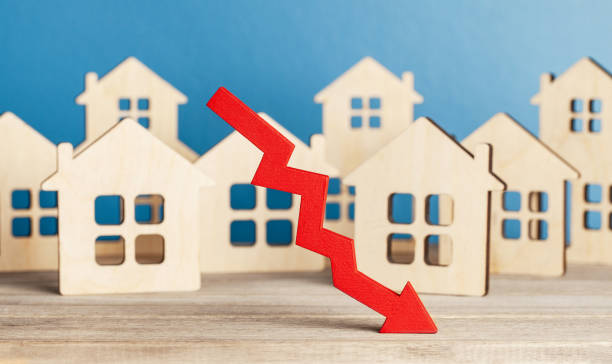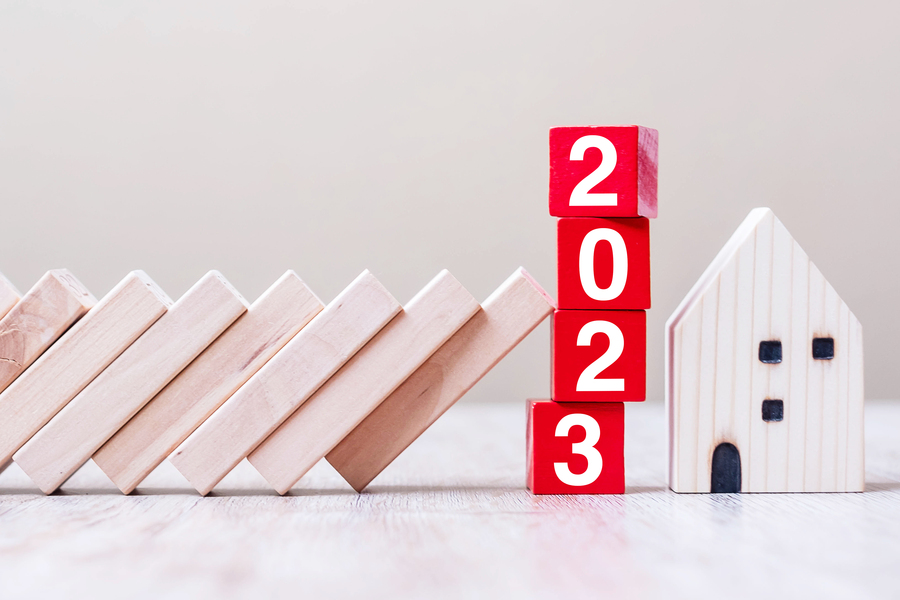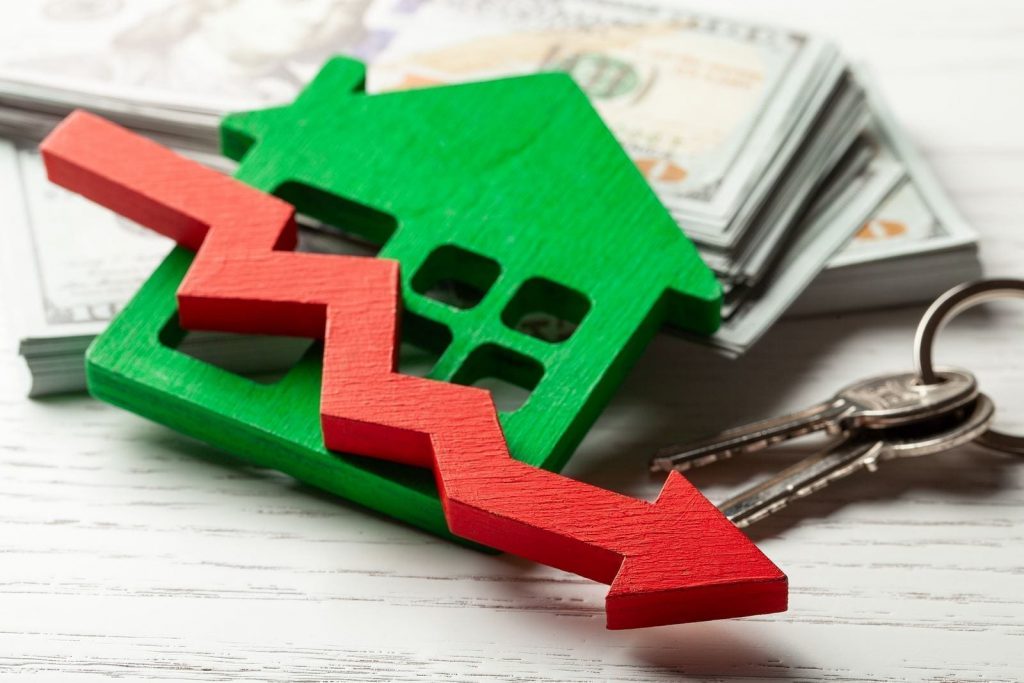A housing market crash is characterized by a rapid and severe drop in home prices, which reduces demand for housing. This can be caused by various factors, including an increase in interest rates, a decrease in demand for housing, or oversupply of housing units. A housing market meltdown can have an effect on the entire economy, affecting investors, homeowners, and the larger financial system.
The 2008 subprime mortgage crisis is a recent example of a housing market crash. There was sharp decrease in home values with many homeowners going into mortgage default, and sharp rise in foreclosures. This, in turn, resulted in the collapse of several large financial institutions, including Lehman Brothers and Bear Stearns.

Reasons for a Housing Market Crash
Economic Recession
The most significant reason that may lead to a housing market crash is an economic recession. The current global economic outlook is not very positive, with many countries experiencing negative GDP growth. The COVID-19 pandemic has had a significant impact on economies worldwide. The unemployment rate in most countries has also gone up significantly, which has led to a decrease in consumer spending, including the purchase of houses. As a result, the demand for homes is declining, which might cause the housing market to fall.
- Overbuilding: When there is an oversupply of housing units, prices can fall as developers fight for purchasers. This may result from misunderstanding market demand, overestimating population increase, or over constructing in an effort to meet anticipated demand.
- Interest Rates: When interest rates rise, the cost of borrowing rises, which can reduce demand for housing. This can lead to a decline in home prices as buyers are unable to afford the higher costs.
- Subprime Mortgage Crisis: This occurs when lenders provide mortgages to individuals who are unable to pay them back. This causes a huge increase in foreclosures, a drop in home values, and, eventually, the housing market to collapse.
Increase in Interest Rates
The housing market is dependent on interest rates. A rise in interest rates can make mortgages more expensive, making it difficult for people to buy homes. If interest rates continue to rise, it may become prohibitively expensive for consumers to purchase homes, reducing demand. This could lead to a decrease in house prices, which could trigger a housing market crash.
Oversupply of Housing
Another reason that may lead to a housing market crash is an oversupply of housing. An oversupply of housing means that there are more houses available in the market than there are buyers. This can happen if there is overbuilding or if the number of people selling their homes increases. An oversupply of housing can cause a drop in house prices and a drop in demand, perhaps resulting in a housing market catastrophe.
Changes in Government Policies
Government policies can have a significant impact on the housing market. For instance, changes in tax policies, building regulations, or zoning laws can impact the housing market. A shift in government policies can cause a drop in home demand, triggering a housing market meltdown.
The Current State of the Housing Market
The current state of the real estate housing market can be described as a seller’s market. Housing demand has increased significantly in the last year, resulting in a shortage of available homes. The COVID-19 pandemic has played a significant role in this surge in demand. With remote work becoming the norm, many people are looking for larger homes in suburban or rural areas, and some are even moving to different states. Additionally, historically low-interest rates have made buying a home more affordable, leading to an increase in demand the real estate market.
As a result of this demand, home prices have skyrocketed. According to the National Association of Realtors, the median home price in the United States reached $334,500 in December 2020, a 13.5% increase compared to the previous year. Additionally, homes are selling faster than ever before, with many receiving multiple offers and selling above asking price.
While this may seem like good news for homeowners and real estate investors, there are concerns about the sustainability of this growth. Many experts are worried that the housing market is in a bubble and that a market crash is inevitable.
What a Housing Market Crash Looks Like
A housing market crash can have a significant impact on the economy, people’s lives, and the real estate industry. The following are some of the ways in which a housing market crash can manifest:
- Decline in House Prices
A housing market crash can lead to a significant decline in house prices. As a result, homeowners may find themselves in negative equity, which means that the value of their house is less than the amount owed on their mortgage. This can make it difficult for homeowners to sell their homes or refinance their mortgages in the real estate housing market.
- Increase in Foreclosures
A housing market crash can lead to an increase in foreclosures. Homeowners who are unable to make their mortgage payments may default on their loans, leading to foreclosure. Foreclosures can lead to a decline in house prices, which could trigger a further housing market crash.
- Increase in Unemployment
A housing market crash can lead to an increase in unemployment. The real estate business is a major employer, and a housing market meltdown can lead to reduction in work opportunities. Furthermore, if the economy is impacted, there may be job losses in other industries, leading to an increase in unemployment.
- Decrease in Consumer Spending
A housing market crash can lead to a decrease in consumer spending. Homeowners who are in negative equity may not have the same level of disposable income as before, which could lead to a decrease in consumer spending. This can lead to a further decline in the economy.

2023 Housing Market Forecast
As we move further into 2023, experts in the housing industry are closely monitoring the economy, which continues to be impacted by various factors, such as high inflation, steep interest rates, geopolitical uncertainties, and fears of a recession.
Despite the challenging economic environment, there are some indications that the housing market is beginning to correct itself. For instance, mortgage rates are showing some signs of easing after reaching 20-year highs in late 2022.
Additionally, home prices, which had experienced a rapid increase in the past couple of years, are starting to come down slowly. However, the decline in prices is making it harder for many homebuyers to find affordable housing.
The National Association of Realtors (NAR) reported that the median sales price for existing homes increased by 2.3% to $366,900 in December 2022 compared to the same month in the previous year. Although this marks the 130th consecutive month of year-over-year price increases, the increase was slower than in November. Meanwhile, month-over-month existing-home sales prices have continued to trend downwards, falling by approximately 11% from their peak of $413,800 in June.
Furthermore, total existing-home sales fell by 1.5% from November to December 2022, marking the eleventh straight month of declining sales and a 34% decrease from the previous year, according to the NAR.
Despite these mixed signals, some experts predict that there may be some reasons for optimism among homebuyers in 2023. Lawrence Yun, chief economist at NAR, suggests that markets in about half of the country are likely to offer potential buyers discounted prices compared to the previous year.
Other experts anticipate an increase in sales activity as home shoppers begin to return in 2023, which could lead to a housing market resurgence in 2024. Nadia Evangelou, senior economist and director of forecasting for the NAR, states that home sales activity may have already hit its lowest point and with mortgage rates stabilizing around 6%, the housing market is expected to recover in 2023 and rebound in 2024.

Will the Housing Market Crash?
Experts predict that the housing market is more likely to experience a correction than a crash. This is partly due to an ongoing inventory problem that is keeping home prices elevated. While there have been double-digit percentage jumps in home prices in recent years, economists believe that there will be essentially no change in home prices nationwide in 2023.
However, there are some areas where homes could see sales and price growth, particularly in locations where home prices have remained affordable in relation to median income. While some markets may see prices continue to increase, others may experience a 5% drop in home prices.
One factor that suggests today’s homeowners are on more secure footing than those who weathered the 2008 financial crisis is that a high number of borrowers have positive equity in their homes. Homeowner equity is currently at the highest level it has been in several decades. Additionally, mortgage products have become less risky due to more regulations and restrictions in the mortgage market, making it stronger, less volatile, and less risky than it was after 2008.
If there were to be a housing market crash, it would typically result in a 20% to 30% drop in home prices and a decline in home sales. However, there has been no significant jump in foreclosure activity. Experts believe that the housing market is more likely to cool than to crash, with a correction being the most probable outcome.
Should I Buy a House in Now?
Purchasing a house can be a wise financial decision, especially when the housing market is not expected to crash in the near future. The low-interest rates, the availability of affordable mortgage loans, and the continuous growth of the economy make it easier for individuals and families to realize their dreams of homeownership. Furthermore, owning a house offers long-term benefits such as financial stability, equity growth, and the ability to customize your living space to your liking. Therefore, if you are in a stable financial position and are looking for a sound investment, now is the time to consider investing in the real estate housing market. Investing in a property can offer long-term stability and potential for growth. It also provides sense of security and pride of ownership.


